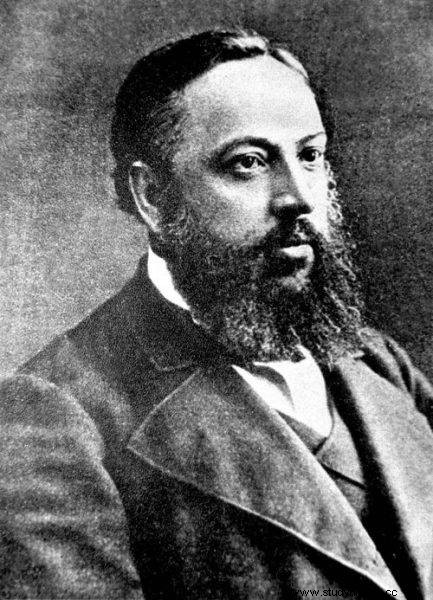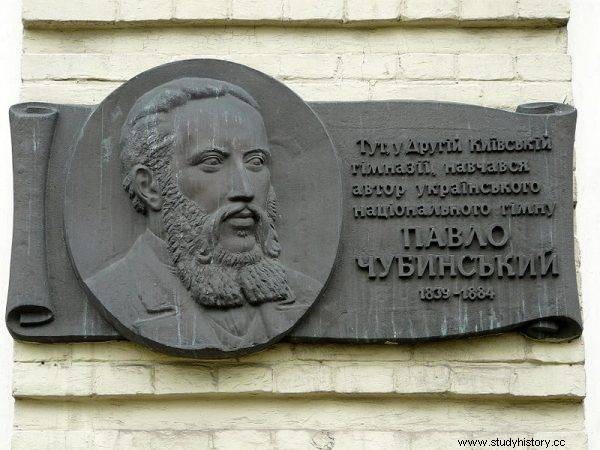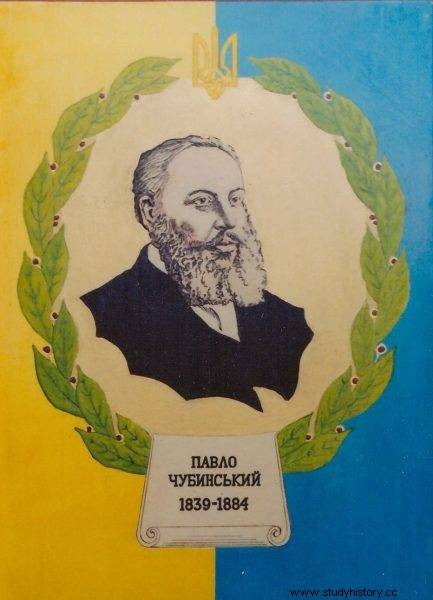The author of the Ukrainian national anthem "Szcze ne wmerła Ukraina" is Pawło Czubynski (1839-1884). Few, however, remember that he came from a Polish landowning family and was exiled for his social activities.
Czubynski was an ethnographer and folklorist. During his lifetime, he made many research expeditions, and in the years 1872-1879 he published a number of scientific works. By the way, his scientific activity still arouses the admiration of researchers. Professor Oleksandr Bileckyj wrote that the "volume and substantive value" of these publications is "impressive". But Czubynski went down in the history of Ukraine as the author of the country's current anthem . An interesting fact is that this work was written by accident, and the author did not suspect that the poem would play such a large role in the lives of Ukrainians.
Childhood and young years
Paweł Czubynski is of Polish and noble origin. Biographical data on him are quite scarce, but it can be presumed that the Czubiński family - like thousands of Polish families - have lived in today's Ukraine for generations. As a result of the partitions, not all of them retained their Polish identity, and some Poles became Russified. But not the Czubiński family - it seems the family was under Ukrainian influence.

Paweł was born on January 15 (27), 1839 in his father's estate, called "Czubinka".
Paweł was born on January 15 (27), 1839, in his father's estate, called "Czubinka". The property was located near the city of Boryspil near Kiev, where the airport is now located. He spent his childhood at his parents' home, where he received basic education. Then he continued his education at the district school in the city of Perejasław. After graduating, he entered a gymnasium in Kiev, passed his secondary school-leaving examination there and entered St. Petersburg to study law, which he graduated in 1861.
During his student years, he participated in the activities of the St. Petersburg Ukrainian community. He wrote for the magazine "Osnowa". At the meetings of the Ukrainian diaspora, he had the opportunity to personally talk to luminaries of Ukrainian culture:Mykola Kostomarov, Panteleimon Kulisz, and most of all with the bard Taras Shevchenk, who remained his spiritual teacher forever.
Rebel and poet
After graduation, Pavlo left the capital of the empire and began working in Kiev. First, he was a teacher of jurisprudence in a girls' gymnasium, then he started working as a bailiff in the judicial chamber of the Kiev province. Holding the last of the above-mentioned positions, he aimed at ensuring that all residents were equal before the law, which for obvious reasons did not appeal to the authorities . At the same time, Czubynski's work on bribery among government officials was published in Kiev. Czubynski's views were influenced, among others, by Alexander II's reforms, establishing the institutions of professional judges and juries.
Moreover, Czubynski's worldview changed under the influence of the demonstrations that took place in the Kingdom of Poland in 1861. As a result, Poles living in the Kiev governorate could count on the support of an honest official. No wonder that Paweł's attitude towards the authorities was not the best. On October 20, 1862, the chief of the gendarmes, Prince Dolgorukov, ordered that Czubynski - "for the harmful influence on the minds of the people" - be sent north to the Arkhangelsk Governorate, where he was to live under police supervision.

Commemorative plaque dedicated to the author of the words of the anthem
During his exile, Pavlo managed to write the future national anthem of Ukraine. Apparently, the author created it during a Serbo-Ukrainian meeting, in an apartment he rented in Kiev. During the conversation, Serbian students sang a patriotic song that contained the words:"The heart beats and blood is shed for the homeland." The piece influenced Czubynski so much that he went to the next room and within 30 minutes wrote a text that began with the words:"Szcze ne wmerła Ukraina". However, the composition of this poem did not play any role in Paweł's later life and in the Archangel guberniya. Researchers believe that the shape of this poem was influenced by the current Polish anthem - "Poland has not died yet". Interestingly, "Szcze ne wmerła Ukraina" was probably the only poetry composed by the protagonist of this text.
The poem was first published in December 1863 in the fourth issue of Meta. The composer and clergyman Mykhailo Werbyckij, a well-known author of church music at that time, was delighted with this piece, who supported the text with a melody he had created . The first public performance of the future anthem took place on March 10, 1865, in Przemyśl, at an evening in memory of Taras Shevchenko, who died four years earlier.
Czubynski was then living in Arkhangelsk, where he moved after spending a year in exile. He worked successively as:an investigator, then secretary of the statistical commission, newspaper editor, and an official for the special tasks of the local governor. During his seven years in exile, he did a lot for Russian ethnography. He examined, among others trade, everyday habits, the attitude of the inhabitants to the legal norms in the Arkhangelsk governorate . In addition, while in exile, he repeatedly initiated actions to help impotent women and orphaned children.

“The Ukrainian anthem is amazing. At first glance it is not impressive, but it is only at first glance "
When in 1869 Pavlo presented the results of his ethnographic research to the Russian Geographical Society, the scope of his work prompted scientists to apply for the exile to leave Arkhangelsk and live in the center of the Empire. So it happened, the scientist returned to Borispol. There he continued his ethnographic research. He died in 1884
Life after life
Czubynski's text Szcze ne wmerła Ukraina received more publicity than his extensive research. In 1908, the work was published in Tsarist Russia in an anthology entitled "Ukrainian muse". In 1910, the song was sung and recorded by the famous opera singer, Modest Męciński in a recording studio in Cologne. In the years 1917-1921, the government of the Ukrainian People's Republic (URL) used this song as one of its anthems (it should be noted that in 1920 the army of the URL fought side by side with the Poles). In 1917 a translation of the song appeared in The New York Times.
During the Soviet era, when Ukraine became one of the union republics of the USSR, Moscow did not want the hymn of Soviet Ukraine to be the song "Szcze ne wmerła Ukraina" . It was feared that it would spark "separatist sentiments". It was only during perestroika, in 1989, at the "Czerwona Ruta" music festival, that a piece written by Paweł Czubynski was first performed in public.
After Ukraine regained independence, the Verkhovna Rada of Ukraine approved this song as the national anthem. It took place on January 15, 1992. The contemporary Ukrainian composer describes Czubynski's piece as follows:
"The Ukrainian anthem is amazing. At first glance, it does not impress, but it is only at first glance (...) it was created by Mychajł Werbycki, a composer of church music, [who] lived in the Austrian monarchy, apparently loved Schubert very much (...) he created this patriotic song as an Orthodox work (...) This is an exceptional work:the anthem of Ukraine has elements of the divine liturgy (...) "
